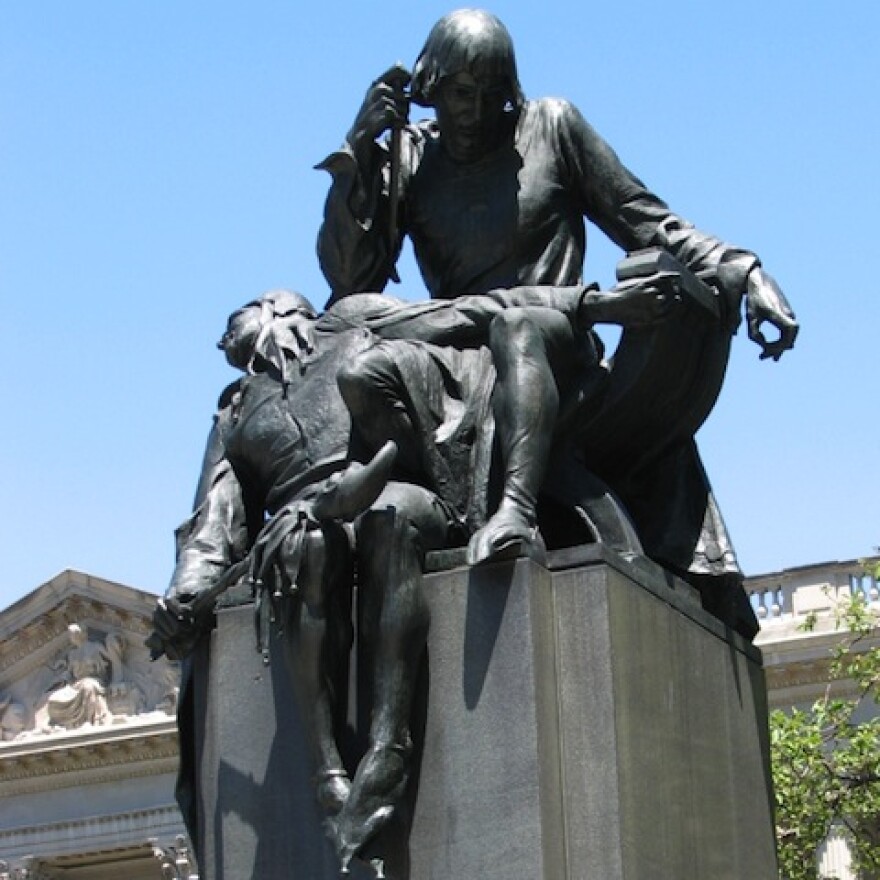Discoveries from the Fleisher Collection broadcasts Saturday, December 7th, 2013, 5-6 pm on WRTI and wrti.org. Shakespeare continues to live, and if you were to name an orchestral work based on one of his plays, we wouldn’t blame you for coming up with one of the most popular works in the repertoire, Tchaikovsky’s Romeo and Juliet. But it wouldn’t be Discoveries without a curve ball or three, so this month we offer another Fantasy-Overture of his, Hamlet. As in Romeo and Juliet and his other Shakespeare tone poem The Tempest, Hamlet isn’t the retelling of a drama. Instead, Tchaikovsky composes a psychological study.
He had been asked to write music for the play. The production was canceled, but Tchaikovsky went on to finish the piece as a separate work. A few years later he did cobble together incidental music (Op. 67b) when the staging finally happened. In it he used music from this Fantasy-Overture and some other works, but he was never happy with the result. This one, however, fascinates in its tragic drive.
In our second program in a row with works inspired by Shakespeare in the Fleisher Collection, we pair one fateful figure, Hamlet, with another, and open the show with two works on Macbeth. Composed the same year as Tchaikovsky’s Hamlet, the Macbeth of Richard Strauss shows a young composer wrestling with similar issues of form. Macbeth isn’t performed nearly as often as the later tone poems Eulenspiegel, Zarathustra, and others, but the Strauss voice is strong and enveloping.
With the brief Prelude to his opera Macbeth, Verdi sets his own psychological stage in the most efficient terms.
We’re happy to find room for Verdi's 200th anniversary celebration before the year runs out. With the brief Prelude to his opera Macbeth, Verdi sets his own psychological stage in the most efficient terms. Macbeth’s indecision, the machinations set in motion with his wife, the threat of doom, and even the witches in the woods are meticulously etched, as the curtain rises.
An English composer thoroughly versed in the theater is Edward German, music director of one of the venues called the “Globe Theatre,” this one, from 1868 to 1902, on Newcastle Street in London. He composed concert music but made his career in comic operas and other light incidental music, even finishing a work of Sullivan’s after Sir Arthur’s death in 1900. His Three Dances from the Music to Shakespeare's Henry VIII recall forms and styles from The Bard’s own time but nevertheless yielded a very modern result. Within the first year of publication, sheet music sales of the dances topped 30,000.
Not bad for music surrounding a king who, if not precisely acquainted with tragedy himself, certainly was the author of it for others.
Even before Edward German’s time there were doubts that Shakespeare had written all of Henry VIII; scholars are still uncertain but believe that he wrote at least half of it. In any case, Shakespeare inspires on stage and in music down to this day. The many works in the Fleisher Collection owing their existence to his genius is proof enough (ask for a list!). No matter where the composer is from—Italy, Russia, Germany, or yes, even England—Shakepeare continues to live.
PROGRAM:
Giuseppe Verdi (1813–1901): Macbeth, Prelude (1847)
Richard Strauss (1864–1949): Macbeth (1888)
Peter Ilyich Tchaikovsky (1840–1893): Hamlet, Fantasy-Overture, Op. 67a (1888)
Edward German (1862–1936): Three Dances from the Music to Shakespeare's Henry VIII (1892)
Riccardo Muti conducts the Orchestra of La Scala in Verdi's Prelude to Macbeth:
http://youtu.be/77k_jcVYypc
On the first Saturday of the month Jack Moore and I host Discoveries from the Fleisher Collection on WRTI 90.1 FM in Philadelphia and on the all-classical webstream at wrti.org. We also broadcast encore presentations of the entire Discoveries series (now 12 years and counting!) every Wednesday at 7:00 pm on WRTI HD-2. For a look at all the shows, click here.

